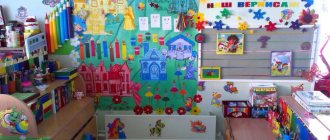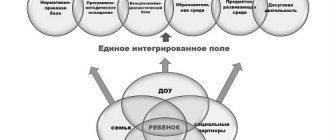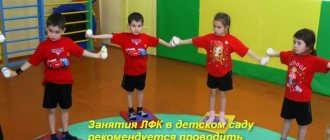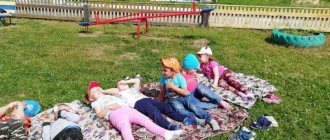Organization of circle work in preschool educational institutions; methodological development on the topic
Consultation for teachers
“Planning and organizing circle work
preschool teacher"
prepared:
teacher Yulbarisova L.M.
In connection with changes in the law of the Russian Federation “On Education” and the definition of Federal State Requirements for the structure of the basic educational program, the introduction of Federal State Standards, the work of raising children in preschool institutions is changing. Currently, not only basic education, but also additional education plays a big role in the development of a child.
The variable part of the program, formed by participants in the educational process, is circle work. Club work in a preschool educational institution has long become the norm of activity of the teaching staff and has gone beyond the scope of innovation. The variety of clubs and the content of their work amazes a person who is far from preschool pedagogy. However, no matter how different the circles may be at first glance, they have a lot in common, and in organization and functioning they are subject to general laws.
A circle is an informal, free association of children in a group for activities based on their common interest, based on additional material to the tasks of the Education and Training Program in kindergarten under the guidance of an adult (teacher).
It is necessary to draw the attention of teachers to two points recorded in this definition.
Firstly: the circle is organized based on the interests and needs of the children. At the same time, the teacher should pay attention to the wishes of parents, which can be identified through various forms of work with them: conversations, consultations, parent-teacher meetings, etc.
Secondly: The work of the circle is based on material that exceeds the content of the state standard of preschool education. Thus, circle work in preschool educational institutions refers to additional education for children.
Clubs in kindergarten perform several functions:
- educational - every pupil of an educational institution has the opportunity to satisfy (or develop) their cognitive needs, receive additional development of skills in the type of activity that interests them;
- socially adaptive - classes in clubs allow students to gain socially significant experience of activity and interaction, experience a “success situation”, and learn to assert themselves;
- correctional and developmental - the educational process implemented in the circle classes allows you to develop the intellectual, creative, physical abilities of each child;
- educational - the content and methodology of work in circles has a significant impact on the development of socially significant personality traits, the formation of communication skills, the education of social responsibility, collectivism, and patriotism.
Clubs as a form of additional education in preschool educational institutions can be opened for various purposes:
- Deepening and expanding basic knowledge, advanced child development or compensatory activities (for children with developmental delays).
- Familiarization with areas of knowledge that go beyond the scope of the state Program (working with gifted children).
- Familiarization with areas of knowledge and skills, including the development of self-knowledge, self-regulation, self-development, and the formation of interpersonal communication skills.
The activities of any circle are regulated by regulatory and legal
documents:
- Charter of the preschool educational institution,
— Educational program of the preschool educational institution,
— Regulations on the circle
— Club program (goal and objectives, expected end result)
— The circle’s work plan for the year,
— List of children
— Class schedule
— Quality control materials (effectiveness) of the circle’s work (diagnostic cards)
Algorithm for a teacher’s activities to create a circle (section, studio):
- Study of the regulatory framework.
- Identifying the needs of educational institutions, parents, and children for additional educational services.
- Analysis of the effectiveness of work on children’s assimilation of the state preschool education program.
- Development (selection) of the circle program.
- Development of a club plan for the academic year.
- Approval of the program and work plan of the circle of the head of the preschool educational institution.
- Implementation of the circle’s work plan in practice.
- Analysis of the performance of the circle.
- Protection of work results in front of the parent and teaching community. (circle work corners, exhibitions, participation in competitions, shows, etc.)
Club work is carried out throughout the academic year by teaching staff and specialists.
Club work is organized in accordance with the direction of the circle’s activities, based on the selected program of additional education, which should not duplicate the main educational program of the Institution.
The age of children involved in club activities is from 1.5 to 7 years.
The activities of the circles are carried out in a group, a research laboratory, a music and physical education hall, depending on the topic and educational objectives.
The heads of the circles provide reports on the results of the circle’s activities at the meeting of the final pedagogical council.
The course lasts 8 months (from October to May). Classes are held 4 times a month in 2 half days.
The main task of the teacher is to find the right emotional wave of communication with children. This should be easy, relaxed communication that brings mutual pleasure to children and adults.
It is important to take into account that the organization of clubs involves the voluntary (without psychological coercion) inclusion of children in activities, therefore, in addition to the selection of interesting content, there are a number of specific conditions:
– organization of work space;
– the opportunity for children to engage in activities according to their strengths and interests.
– the playful nature of the presentation of any material;
Club leaders organize their activities through the following forms:
- With kids:
— Frontal classes (group)
- Excursions
— Themed walks
— Entertainment, leisure
— Participation in various level competitions
- With teachers:
— Consultations, master classes, seminars for preschool teachers
- With parents:
— Consultations, master classes, speeches at parent meetings, information on the website.
Circles can be of different directions:
Physical development
Social and personal development
Cognitive and speech development
Artistic and aesthetic development
The topics of the circles can be varied.
When organizing the activities of clubs, teachers should take into account:
— the interests of children and the voluntariness of their choice of a circle;
- age characteristics of children, their experience of participating in this type of activity;
— the need to solve educational and educational problems in unity with the main kindergarten program;
- understanding the game as a leading type of activity and building the content of additional education for children on its basis;
— the need to create a comfortable environment in which a creative personality will develop;
- norms of load on the child.
Club work in kindergarten is one of the areas of creative, physical, social, personal and intellectual development of pupils in addition to the main general education program of preschool education implemented in preschool institutions.
Club work strengthens and enriches one or another line of educational activities of preschool educational institutions.
Documentation:
Club work program (perspective-thematic planning)
Diagnostics.
Scheme for developing a circle work program.
- Title page
- Explanatory note (relevance, goals and objectives)
- Expected results (intended result)
- Educational and thematic planning
- Diagnostic cards, diagnostic methods
- Bibliography
Online classes and apps for kids
In our digital era, there are a huge number of “developmental” activities, clubs and thematic courses for children in the format of podcasts, audio lectures, online or as a mobile application.
Such activities can be carried out at home and with their help you can organize useful and interesting leisure time for your child, saving time and money.
Useful educational apps for children 2–10 years old
| Application | Age | For what? |
| Mathematics and numbers for children | 2–6 years | It will help you learn numbers and teach you how to count, including in a foreign language. |
| “A very hungry caterpillar. Shapes and colors" | 2–4 years | Together with the character from the popular book by Eric Carle, the child learns to sort objects by shape, size and color. |
| Letters: learning to read is fun | 5–6 years | Introduces letters, helps to learn to read syllables. |
| Thinkrolls: Kings & Queens | 4–7 years | In a playful way, it introduces the child to the laws of logic and physics and teaches them to apply them. |
| "Geography of the World" | 7–10 years | In an interactive and visual form, it will help you remember the names of countries, their flags, and positions on the map. |
⠀ For older children, in addition to quite familiar classes in school subjects, painting or programming, you can now find offers on the Internet for online training in dance, gymnastics and even football.
We motivate you to develop independently
Another advantage of Internet learning technologies is that for children there are now not only areas related to intellectual development, but also ones that help to form motivation, self-organization and practical habits that will make the child’s life much easier in adulthood. For example, the Pingo application, which works in tandem with the “Where are my children” application, is made in the “develop and entertain” concept.
Every day the child receives various tasks related to certain activities: intellectual, household, physical education, entertainment. The list of options is updated by the application developers, as well as by the users and experts themselves.
For completing tasks, points are awarded that help the child achieve a particular goal. The goal is discussed with parents in advance.
By completing tasks, children not only receive a new interactive format for interacting with their parents, but also quietly develop useful habits, learn new things, have fun and usefully spend their time. Read more about this here.
Download the apps right now and keep your child busy with interesting, useful things. And most importantly, free up some time for yourself and motivate your child to develop independently.
What additional music clubs can be taught in kindergarten?
Let me explain what prompted the question. My 5-year-old attends some classes 1-2 times a day, but she does not go to kindergarten. At the same time, many mothers whose children are the same age as mine go to kindergarten full time, and try to fill every evening after kindergarten with some kind of activity. I'm talking about stay-at-home moms. Moreover, this is not a sport/music school or something else that the garden cannot provide, but ordinary developmental training, general physical training, and rhythm.
And I asked her when the clubs were held, what exactly the children were taught there, and how this related to free education and matinees.
Many glossy magazines and popular media tell us that a successful person should not have a free minute, all his affairs should be planned a month in advance, and attention should be paid to self-development. Are we transferring these adult rules to children? Our kindergarten also has paid clubs - yesterday we signed up for English and a sports club. As part of the general education program, classes are also held, the schedule was posted in the locker room - music class, sports, modeling, drawing and mathematics, like, 1 class every day in the morning. And paid mugs after quiet time.
Sections and clubs: do children need them or are they imposed on us by society?
And remember that there should not be too many sections and circles. Why - see in the next video.
Another point that is worth paying attention to when choosing clubs is communication with peers. If your baby does not have the opportunity to contact other children at home or on the playground, the Early Development Center is a worthy solution to the problem.
Teachers are active organizers of master classes on joint activities, organizing platforms of various types at August conferences, at various regional events, for example: June 1, June 12.
For a child to fully develop, contact with parents and peers is no longer enough. Both those and others can no longer satisfy his growing needs for activity and knowledge. This means it’s time to choose an early development club for your baby.
Graduates attending the “Non-traditional drawing techniques” club, teacher of the first category Galuzina N.A. – continued their studies at a children's art school. Alina Weber - was invited to the Governor's Christmas tree for her excellent studies at the art school.
With reading, I think I can teach it at home + in the older group they all learn it. I don’t see any ability for singing, dancing or drawing among us.
How to order a master class
If interest in a hobby was lost, then without any hesitation we parted with this activity and looked for something new. It’s impossible to say for sure whether this is good or bad, but the child always had the right to choose.
At first, I also thought that the dance club was for children who would show some special dance numbers, but they explained to me that it was not. The circle is learning all the dances for the matinee, but I don’t think I have to worry, my son will recite some rhyme. Well, since there won't be any dancing. I meant to pick them up while they were walking in the garden. I wrote above that it is unrealistic to pick up after a walk and go for ANOTHER walk.



